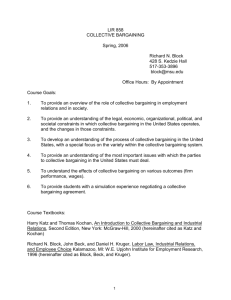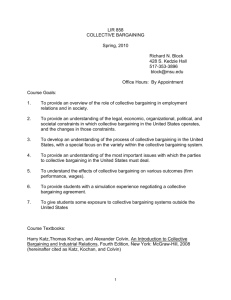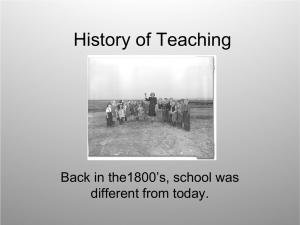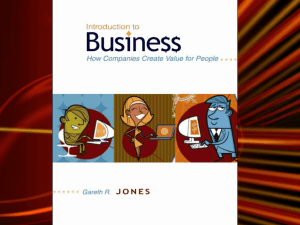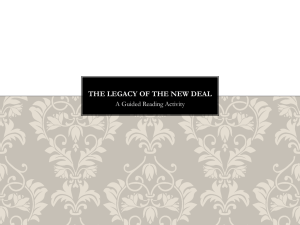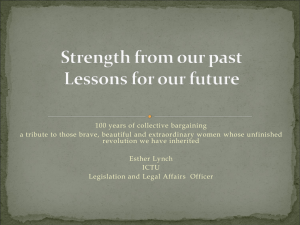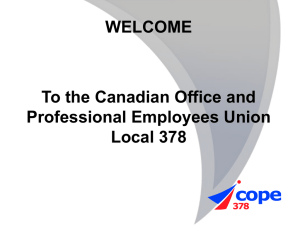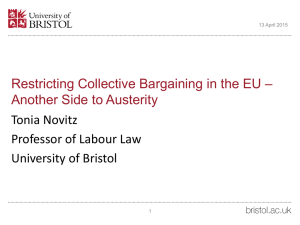LIR 858 Syllabus, Spring, 2011
advertisement
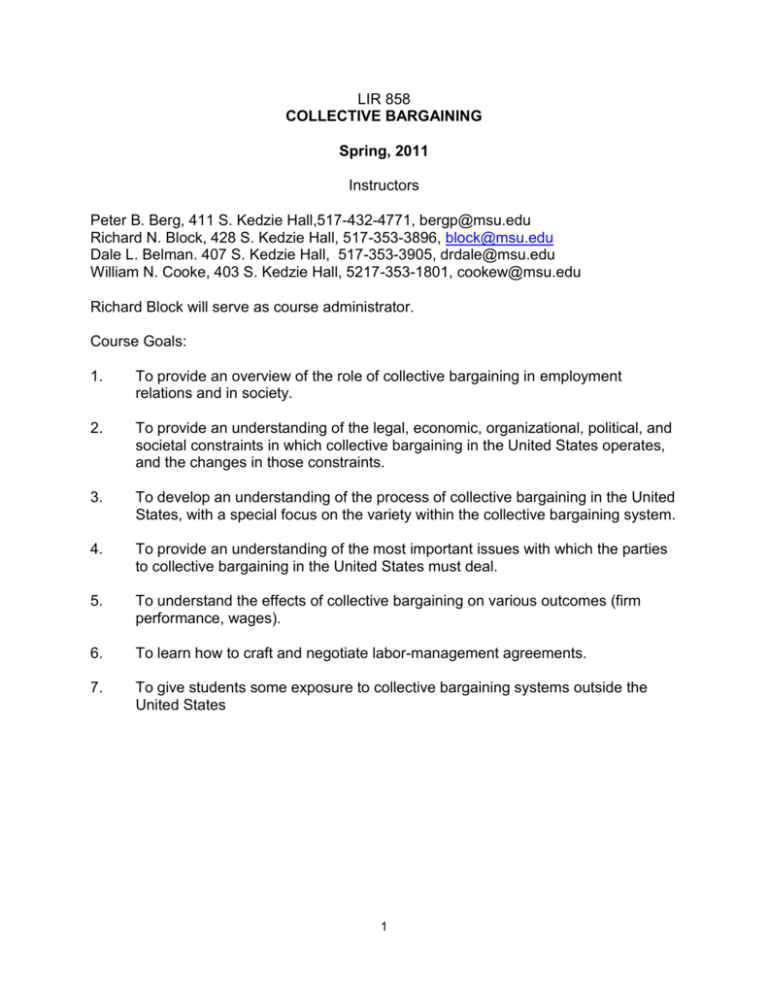
LIR 858 COLLECTIVE BARGAINING Spring, 2011 Instructors Peter B. Berg, 411 S. Kedzie Hall,517-432-4771, bergp@msu.edu Richard N. Block, 428 S. Kedzie Hall, 517-353-3896, block@msu.edu Dale L. Belman. 407 S. Kedzie Hall, 517-353-3905, drdale@msu.edu William N. Cooke, 403 S. Kedzie Hall, 5217-353-1801, cookew@msu.edu Richard Block will serve as course administrator. Course Goals: 1. To provide an overview of the role of collective bargaining in employment relations and in society. 2. To provide an understanding of the legal, economic, organizational, political, and societal constraints in which collective bargaining in the United States operates, and the changes in those constraints. 3. To develop an understanding of the process of collective bargaining in the United States, with a special focus on the variety within the collective bargaining system. 4. To provide an understanding of the most important issues with which the parties to collective bargaining in the United States must deal. 5. To understand the effects of collective bargaining on various outcomes (firm performance, wages). 6. To learn how to craft and negotiate labor-management agreements. 7. To give students some exposure to collective bargaining systems outside the United States 1 Course Textbooks: Harry Katz,Thomas Kochan, and Alexander Colvin, An Introduction to Collective Bargaining and Industrial Relations, Fourth Edition, New York: McGraw-Hill, 2008 (hereinafter cited as Katz, Kochan, and Colvin) Richard N. Block, John Beck, and Daniel H. Kruger, Labor Law, Industrial Relations, and Employee Choice Kalamazoo, MI: W.E. Upjohn Institute for Employment Research, 1996 (hereinafter cited as Block, Beck, and Kruger). LIR 858 Coursepack, Spring, 2011, available through Dollarbill Copying at Student Bookstore, 417 E. Grand River Avenue, East Lansing Course Work/Grading: 30% Short paper (3 pages on any two of seven possible topics due on specified dates -- each paper is 15% of the final grade) [Send to Prof. Block] 15% In-class group debate (group grade for one of 4 possible debate topics) 15% Required Paper: Contract comparison (3 pages) [Send to Prof. Block] 20% Bargaining exercise (group grades) 20% Final Examination There will be no deferred grades or incompletes given for the course. If you require accommodation for religious, disability, or other purposes, please make an appointment to discuss the matter with Rich Block. 2 COURSE TOPICS1 (NOTE: With notice to students, dates and topics may change depending on the availability of possible guest speakers.) January 13 (Week 1), Berg Course Overview and Introduction Class experiences with collective bargaining and industrial relations. January 20 (Week 2), Belman and Berg Theoretical Framework and Historical Context Katz, Kochan, and Colvin, Chs. 1-2, “A Framework for Analyzing Collective Bargaining and Industrial Relations” and The Historical Evolution of the U.S. Industrial Relations System” John Budd, 2004, “Objectives of the Employment Relationship" (LIR 858 Coursepack) Biel and Wickerstam. 1967. “An Interpretation of American Union History” (LIR 858 Coursepack) John R. Commons, American Shoemaker, 1648-1895” (LIR 858 Coursepack) Bruce Kaufman, 1993. “The Origins of Industrial Relations” and “The Schism in Industrial Relations” (LIR 858 Coursepack). 1Dates for topics are subject to change. Dates for the mock bargaining and the due dates for assignments are not subject to change. 3 January 27 (Week 3) Block Discussion of contract comparison paper The Contexts of Bargaining: Legal, Social, Economic, Political Block, Beck, and Kruger, Ch. 1, "Introduction and Overview" Block, Ch. 2, Richard N. Block, “Competitiveness and Employment Protection and Creation” Katz, Kochan, and Colvin, Ch. 4, "The Role of the Environment" Richard N. Block, Peter Berg, and Dale Belman, 2004, “The Economic Dimension of the Employment Relationship (LIR 858 Coursepack) Charles Craypo, “Sources of Union Bargaining Power” (LIR 858 Coursepack) February 3 (Week 4) Berg The Actors in Collective Bargaining: Employers and Unions Katz, Kochan, and Colvin, Ch. 5 and 6, "Management Strategies and Structures for Collective Bargaining" and ”Union Strategies and Structures for Representing Workers” Christopher Schenk. 2004. “Social Movement Unionism: Beyond the Organizing Model.” (LIR 858 Coursepack) Budd, John. “When do U.S. Workers First Experience Unionization? Implications for Revitalizing the Labor Movement,” Industrial Relations. Vo. 49, no.2 (April 2010). [Find on line] 4 Union organizer visit (tentative) February 10 (Week 5) Belman The Organizing Process; The Negotiation Process Katz, Kochan, and Colvin, Chap. 7-8, "Union Organizing and Bargaining Structures" and The Negotiations Process and Strikes” Block, Beck, and Kruger, Chapters. 2, 4. Richard Walton, Joel Cutcher-Gershenfeld, and Robert McKersie, “A Theory of Strategic Negotiations” (LIR 858 Coursepack) Charles Loughran, 1993, “Costing Contract Demands, Offers, and Settlements” (LIR 858 Coursepack) February 17 (Week 6) Block and debate Contract Administration: Grievance Procedures and Arbitration Ch. 11, Katz, Kochan, and Colvin, "Administering the Employment Relationship" Richard B. Peterson and David Lewin, “Research on Unionized Grievance Procedures: Management Issues and Recommendations” (LIR 858 Coursepack) February 24 (Week 7) Professor Michael Polzin or PIERS Models of Collective Bargaining Relationships: Conflict and Cooperation Block, Beck, and Kruger, Chapter 3, Block and Berg, “Joint Responsibility Unionism: A Multiplant Model of Collective Bargaining Under Employment Security.” (LIR 858 Coursepack) March 3 (Week 8) Belman and Debate 5 The Outcomes of Collective Bargaining: The Collective Bargaining Agreement Katz, Kochan, and Colvin, Ch. 10, “Contract Terms and Employment” March 10 Spring Break March 17 (Week 9) Belman Collective Bargaining in the Public Sector Katz, Kochan, and Colvin, Chap. 13, “Collective Bargaining in the Public Sector” Richard Freeman, 1996, “Through Public Sector Eyes: Employee Attitudes Toward Public Sector Labor Relations in the United States” (LIR 858 Coursepack) March 24 (Week 10) Block and Debate Perspectives and Current Issues in Collective Bargaining and Industrial Relations Thomas A. Kochan, 2001, “Can the U.S. Industrial Relations System be Transformed?” (LIR 858 Coursepack) Kate Bronfrenbrenner and Tom Juravich, 1994, “The Impact of Employer Opposition on Union Certification Win Rates” (LIR 858 Coursepack) Chris Benner and Amy Dean, “Labor in the New Economy: Lesson from Labor Organizing in Silicon Valley” (LIR 858 Coursepack) Cutcher-Gershenfeld, Joel, Steven Sleigh, and Frits Pil. “Collective Bargaining: Keeping Score on a Great American Institution.” (LIR 858 Coursepack) March 31 (Week 11) Berg and Debate Other Systems of Industrial Relations: The United States, Canada, Europe, Asia Katz, Kochan, and Colvin, Chap 14 “International and Comparative Industrial Relations” 6 Harry C. Katz, 1993, “The Decentralization of Collective Bargaining: A Literature Review and Comparative Analysis” (LIR 858 Coursepack) Frege, Heery, and Turner: “The New Solidarity? Trade Union Coalition-Building in Five Countries.” (LIR 858 Coursepack) Web Memo: “Employee Free Choice Act would Disenfranchise 105 Million Workers.” (LIR 858 Coursepack) April 7-April 28, Cooke Negotiating Labor-Management Agreements for Competitive Advantage: The Primo Plastic & ASPRW Simulated Negotiations Case The objective of this four-week simulated negotiation exercise is to expose you to a comprehensive framework that identifies the multiple linkages between collective bargaining strategies and broader HRM, operational and business strategies. Blending interest-based and classical approaches to negotiations, you will learn about the essential processes and tactical decisions underlying the key stages of negotiating agreements. Through this life-like simulated exercise, you will gain hands-on experience covering (a) the analysis, framing and formulation of negotiation strategies and (b) the behavioral dynamics underlying the steps and processes of effectively negotiating labor-management agreements in a contemporary context. May 1 (Finals Week) 7
